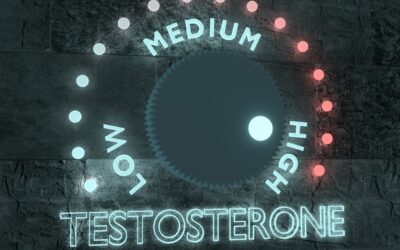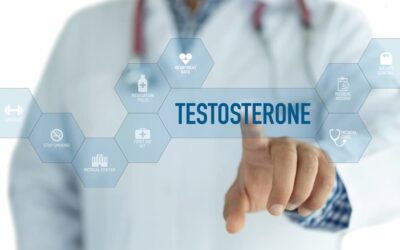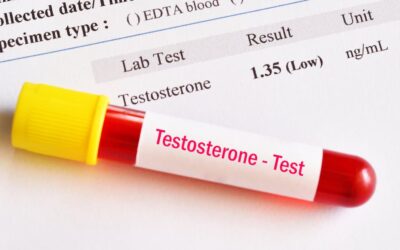Signs of Low Testosterone in Men
Searching for answers to your recent health issues? Maybe it’s low testosterone? Low testosterone levels are all-too-common for men older than 30. In fact, most men will experience low testosterone, or Low-T, at some point in their life. It’s a natural occurrence, so it’s best to have the facts and plan ready for when it does hit.
What Is Low Testosterone?
Testosterone is the hormone that everyone thinks about when they think “MEN.” It’s a crucial hormone that kicks puberty into high gear. Testosterone stimulates muscle and bone growth (1). But, it does so much more.
Many men will have a drop in their testosterone after around 30 years old. That’s because around this time your testosterone tends to drop as much as 3% each year (2). When testosterone drops too much and gets too low, that’s when men start to notice significant changes in their health.
What is low enough to cause a problem in one guy might not be the same as another guy. This is because there’s huge variability in testosterone from one man to the next (3). A lot of factors are involved like age, muscle mass, diet, and other blood chemistry markers.
What Are Normal Testosterone Ranges for Healthy Men?
This is kind of a “Gotcha” question. While there is a clearly defined range for testosterone in men, it’s very general.
The normal testosterone range for healthy men is considered to be 240-900 ng/dL in men >18 years old (3).
However, this range doesn’t take into account your age. I think we can all agree we’d expect to see a 20 year-old guy to be in the upper range of normal around 900/dL. An 80 year old man on the other hand? They’re probably in the lower range, around 300ng/dL.
We expect testosterone to drop as we age. So an 80-year-old with testosterone levels at 700ng/dL fits the definition of “normal” it could be considered high. And a 35-year-old with a testosterone level of 400ng/dL is also “normal” they could still be experiencing symptoms of low testosterone.
This is why it’s so important to work with a physician that specializes in hormones. Measuring testosterone alone is not enough. They will be able to interpret your lab results along with the symptoms you report to determine what is going on.
Common Signs of Low Testosterone
1. Low Sex Drive
Testosterone plays a clear role in your libido. A decrease in testosterone due to aging is associated with reduced sex drive (4, 5). On the flip side, higher levels of testosterone are often associated with an increased sex drive. Think back to going through to puberty in high school.
2. Erectile Dysfunction
Several factors play a role in getting an erection when you’re aroused. Testosterone is involved in boosting nitric oxide levels. It does this by binding to specific receptors in the brain that coordinate nitric oxide production. By raising nitric oxide levels your blood vessels can dilate and blood flow can increase to your penis (4, 6, 7).
3. Low Semen Volume & Impaired Sperm Development
Testosterone plays a critical role in both the production of semen and sperm. Low levels of testosterone are associated with low levels of semen volume. It appears low testosterone results in misshaped and non-viable sperm. In fact, low testosterone may be a primary contributing factor to the rise in male infertility (8).
4. Hair Loss
Low testosterone itself doesn’t necessarily result in hair loss in men. Rather, improper breakdown of testosterone tends to drive hair loss as men age. Dihydrotestosterone (DHT) can build up when testosterone is broken down by an enzyme called 5-alpha-reductase. If testosterone is broken down too quickly this can result in a build-up DHT (9, 10).
5. Low Energy Levels
Low energy is often one of the overlooked signs of low testosterone. Many men attribute their poor energy to stress at work, stress at home, and not getting enough sleep. However, low energy levels may actually be the result of low testosterone. Restoring testosterone to normal levels has been shown to improve energy and reduce fatigue (2, 4, 5).
6. Decreased Lean Muscle Mass
Along with growth hormone, testosterone is one of the primary hormones involved in skeletal muscle maintenance. As we age both growth hormone and testosterone decrease and muscle loss follows. Studies have shown through testosterone therapy and eating a reduced-calorie diet you can burn fat and increase muscle mass (1, 2, 4, 11, 12 , 13, 14).
7. Increased Body Fat
A study that looked at nearly 400 males between the ages of 20 and 85 showed a direct connection between testosterone and body fat. Low levels of testosterone were appeared to play a causal role in fat gain for men. Restoring testosterone levels resulted in an improvement in overall body composition (1, 2, 4, 11, 12 , 13, 14).
8. Decreased Bone Mass
Testosterone directly impacts something called bone mineral density (BMD). Your BMD is a way to quantify the strength and toughness of your bones. Men with low levels of testosterone have a greater risk of breaks and fractures as a result. Studies have shown that testosterone therapy can also restore BMD and reduce bone damage (15).
9. Mood Swings
Low testosterone is associated with depression. Testosterone plays a key signaling role in the brain that helps to stabilize mood and cognition (16, 17).
10. Memory Loss
Multiple studies have shown testosterone’s role in the brain. One study showed testosterone produced activation of specific areas of the brain related to memory retrieval. This means when testosterone levels dip, it becomes hard to remember things from your past (18).
What Causes Low Testosterone?
Several different things that can contribute to low testosterone. The following are some of the more common causes of low testosterone:
- Aging (2)
- Poor Sleep (19)
- Diabetes (7)
- Poor Diet (2, 4)
- Alcoholism (20)
- Lack of Exercise (2, 4)
- Chronic Inflammation (2, 4)
- Statin Medications (21)
- Chronic Stress (2)
Common Side-Effects of Testosterone Therapy
Generally speaking, TRT is very safe and effective. There are some mild side-effects which include:
- Acne
- Fluid Retention
- Decreased Testicle Size
- Changes In Cholesterol
- Increase In PSA
- Decreased Sperm Count
- Contribute To Sleep Apnea
- Increased Risk of Blood Clotting
These side-effects are rare but may possibly occur due to TRT.
Low Testosterone Treatment Options for Men
You can’t turn back the clock and age in reverse but you can definitely work on your bad habits. Regardless of what you’re doing make sure to work with your physician for guidance. Improving your sleep and diet can make a big difference in your testosterone. Exercise, specifically weight training exercise, can boost testosterone. Sometimes this isn’t enough, but there’s still more you can do!
When you feel like you’ve run out of options, there is always testosterone therapy. Testosterone therapy, or TRT, must be prescribed by a physician. It only makes sense to try and work with a physician that is highly trained in this therapy.
Testosterone therapy works by supplying your body with exogenous testosterone. This prescription can come in the form of pills, patches, gels, pellets, and injections. Injections tend to provide the greatest dosing control and are the most economical. Injectable testosterone has been around the longest and has the largest body of research supporting its use.





